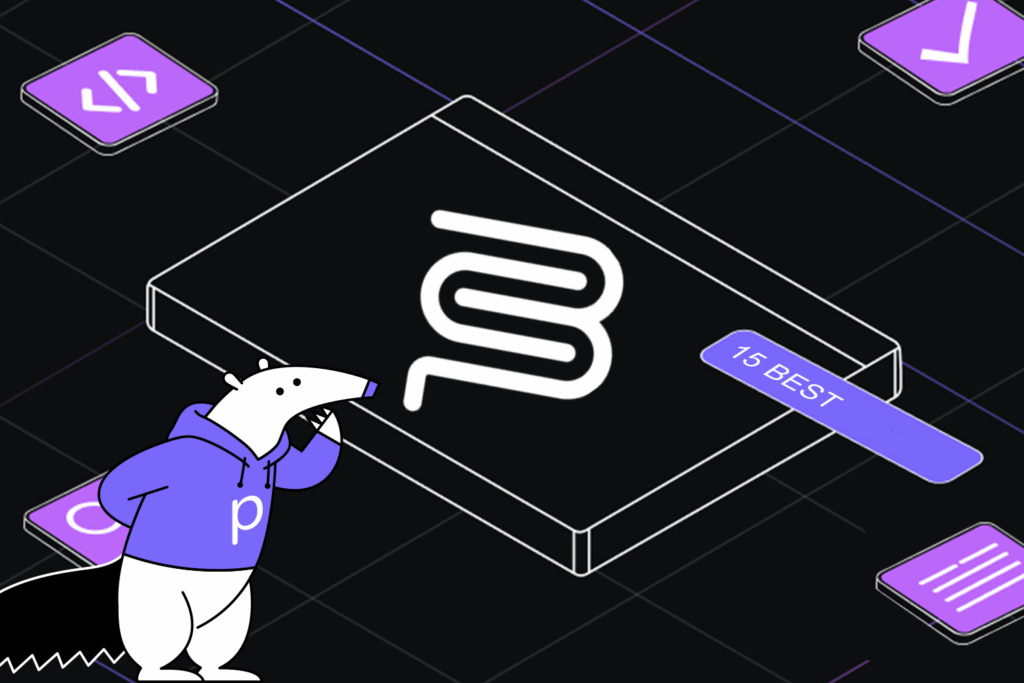Laravel Testing with Qodo (formerly Codium) IDE Extension
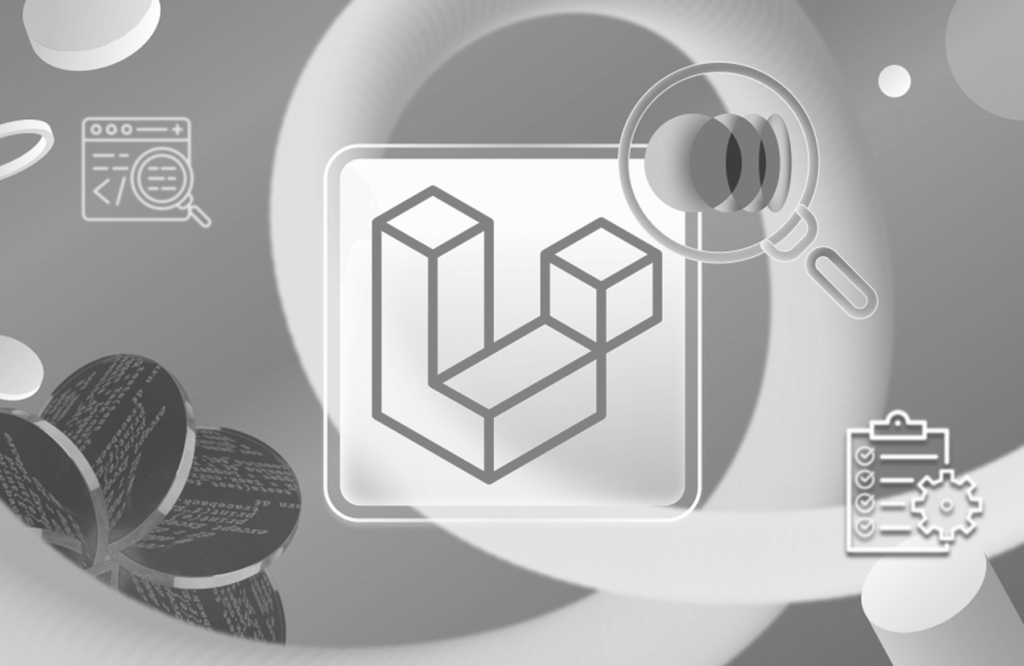

Laravel is a popular PHP framework renowned for its simplicity and elegance in developing web applications. Offering developers a robust toolkit and streamlined development process, Laravel has gained widespread adoption worldwide, owing to its expressive syntax and comprehensive documentation.
However, amidst the development journey lies an important aspect: testing. Testing plays a vital role in Laravel development by ensuring the application functions as intended and remains stable across various scenarios. By rigorously testing their code, developers can preemptively identify and resolve bugs, thereby mitigating potential issues during production. Moreover, testing instills confidence in developers to refactor code without compromising existing functionality, paving the way for smoother and more robust application development.
Introducing Qodo (formerly Codium) IDE Extension-a pioneering tool engineered to optimize the testing process for developers. Seamlessly integrating with a range of popular integrated development environments (IDEs), Qodo (formerly Codium) revolutionizes the way developers approach testing in Laravel projects. With its advanced functionalities, qodo (formerly Codium) helps developers write and analyze tests more efficiently, leading to elevated quality and reliability in Laravel applications.
Now, let’s explore in depth how Qodo (formerly Codium) revolutionizes Laravel testing and enhances the development experience.
Prerequisites
Before you proceed with this article, ensure you have the following:
- PHP: Make sure you have PHP installed on your system. You can download and install PHP from the official PHP website. Follow the installation instructions provided for your operating system.
- MySQL: Install MySQL to manage your database. Visit the official MySQL documentation for installation instructions tailored to your operating system.
- Composer: Composer is a dependency manager for PHP. You’ll need Composer to install PHP packages and manage dependencies for your projects. You can install Composer by following the instructions on the official Composer website.
- Laravel (optional): You can follow the instructions in the official Laravel documentation.
- An IDE: You’ll need an integrated development environment (IDE) to work with our Laravel project. In this article, we use Visual Studio Code (VSCode), a popular and versatile IDE. You can download and install VSCode from the official website.
- Local Server Environment: Set up a local server environment such as XAMPP, WampServer, or Laravel Valet. These tools provide Apache, MySQL, and PHP stack for hosting web applications locally. Choose one that suits your operating system and preferences.
- Basic Knowledge of Laravel: Familiarity with Laravel will be helpful as we explore testing Laravel projects with Qodo (formerly Codium) IDE Extension. If you’re new to Laravel, consider going through the official Laravel documentation or completing introductory tutorials to gain a basic understanding of Laravel concepts and syntax.
Understanding Testing in Laravel
Laravel testing consists of various types, each serving a specific purpose in ensuring the reliability and functionality of the application.
Types of Tests in Laravel
- Unit tests: These tests focus on isolating and testing individual units or components of the application, such as methods or classes, in isolation. Unit tests help verify that each unit behaves as expected and meets the specified requirements.
- Feature tests: Feature tests, also known as Integration tests, examine the interactions between different components or parts of the application. These tests simulate real-world scenarios to ensure that the application functions correctly as a whole.
- Browser tests: Browser tests, often implemented using Laravel Dusk, automate interactions with the application’s user interface through web browsers. These tests mimic user behavior to validate the application’s functionality and user experience.
- API tests: API tests evaluate the behavior and functionality of the application’s API endpoints. These tests verify that the API endpoints return the expected responses and handle various input scenarios correctly.
[blog-subscribe]
Importance of Testing for Ensuring Code Quality and Stability
Testing plays a crucial role in maintaining the quality and stability of our applications. By identifying and fixing bugs early in the development process, testing helps prevent issues from surfacing in production, thereby enhancing the overall user experience. Additionally, testing allows developers to refactor code confidently, knowing that existing functionality remains intact.
Challenges Developers Face in Testing Laravel Projects
Despite the benefits of testing, developers often encounter challenges when testing Laravel projects. Some common challenges include:
- Setting up test environments: Configuring test environments and dependencies can be complex and time-consuming, especially when dealing with external services or dependencies.
- Mocking dependencies: Testing code that relies on external dependencies, such as databases or third-party APIs, can be challenging. Developers often need to mock these dependencies to isolate units for testing.
- Test maintenance: As Laravel applications evolve and change over time, maintaining tests to reflect these changes can become challenging. Test suites may require frequent updates to ensure they remain relevant and effective.
- Test coverage: Achieving adequate test coverage across all components and functionalities of a Laravel application can be daunting. Developers must prioritize which areas to test based on their criticality and potential impact on the application.
By understanding these challenges and adopting best practices, developers can overcome obstacles and leverage testing effectively to enhance the quality and reliability of Laravel projects. In the upcoming section, we will discuss Qodo (formerly Codium) IDE Extension, a tool designed to streamline testing processes for Laravel developers, providing advanced features to enhance their workflows.
Qodo (formerly Codium) IDE Extension
Qodo (formerly Codium) IDE Extension is a powerful tool tailored to enhance the testing process for developers. It is a sophisticated tool designed to integrate seamlessly with popular integrated development environments (IDEs) such as Visual Studio Code, IntelliJ IDEA, and others. Offering a comprehensive suite of features, Qodo (formerly Codium) IDE Extension streamlines testing workflows, not only for PHP and Laravel but also for a wide range of programming languages.
The extension provides developers with a versatile testing solution that extends beyond Laravel projects. It seamlessly integrates with leading IDEs, helping developers optimize their testing processes regardless of the programming language they are working with.
Features and Capabilities of Qodo (formerly Codium) for Testing
Qodo’s (formerly Codium) IDE extension goes beyond basic test generation; it offers a comprehensive toolkit to enhance your testing practices. Let’s delve deeper into its key features and recent advancements:
Automatic test generation:
Remember the endless lines of code you write for each test? Qodo (formerly Codium) throws that rulebook out the window! Just point it at your code, and it generates comprehensive and accurate unit, integration, and even feature tests in seconds. This means you can check how different parts of your code work together and simulate user interactions, giving you a broader perspective on your application’s behavior.
Additionally, Qodo (formerly Codium) is adept at understanding various frameworks and coding styles. It continuously adapts to your project’s context, ensuring the generated tests fit seamlessly into your development workflow. It’s like having a coding companion that speaks your language and understands the unique requirements of your project.
Moreover, recent updates to Qodo (formerly Codium) have focused on improving the accuracy of generated tests. By refining its AI model, Qodo (formerly Codium) ensures that the tests it generates are more precise and relevant. This enhances your confidence in the testing process, knowing that potential issues are effectively caught and addressed.
Test customization:
When it comes to test customization, Qodo (formerly Codium) puts you in the driver’s seat. While it generates a solid foundation for your tests, you can fine-tune and refine them according to your project’s specific needs. You can add custom assertions and tailor the tests to adhere to your testing conventions, giving you full control over the testing process.
Qodo (formerly Codium) seamlessly integrates with popular assertion libraries like `pytest` and `chai`. This allows you to leverage your preferred tools and conventions for writing assertions, ensuring consistency and compatibility with your existing testing infrastructure.
Advanced features:
Qodo (formerly Codium) offers advanced features such as sub-behaviors, which allow you to break down tests into smaller, more manageable steps. This enables you to pinpoint and address issues with precision, enhancing the effectiveness of your testing efforts.
Additionally, Qodo’s (formerly Codium) TestGPT feature acts as your mock object creator. It generates mock objects and data for external services like databases and APIs, creating a controlled testing environment that ensures your tests run smoothly without relying on real-world connections.
Lastly, Qodo (formerly Codium) supports data-driven testing, allowing you to create multiple tests based on different data sets. This ensures that your code is robust and can handle various inputs effectively, enhancing the reliability of your application.
Remember, these features are continually evolving. Be sure to check the Qodo (formerly Codium) website and documentation for the latest updates and improvements. Experiment and explore to discover the best ways to leverage these features for your specific needs and coding style. Always remember, Qodo (formerly Codium) is here to enhance your testing process, not replace your critical thinking and coding skills.
Setting Up Qodo (formerly Codium) IDE Extension
Qodo (formerly Codium) IDE Extension offers a seamless setup process for developers, ensuring they can quickly integrate it into their workflow regardless of the programming language or framework they are using. Here’s a step-by-step guide to getting started with Qodo (formerly Codium) IDE Extension and integrating it with your projects:
Installation Process
Installing Qodo (formerly Codium) IDE Extension is simple and can be done directly within your preferred integrated development environment (IDE). For this article, we’ll be demonstrating the installation steps using Visual Studio Code. However, if you’re using a different IDE, no worries. The process remains equally accessible, and you can simply adapt the steps accordingly.
- Open Visual Studio Code and navigate to the Extensions view by clicking on the square icon in the sidebar or pressing `Ctrl+Shift+X` if you’re in a Linux or Windows environment or `CMD+Shift+X` if you’re using a Mac.
- In the Extensions view, search for “Qodo (formerly Codium)” and select the Qodo (formerly Codium) extension from the search results.
- Click on the “Install” button to install the extension.
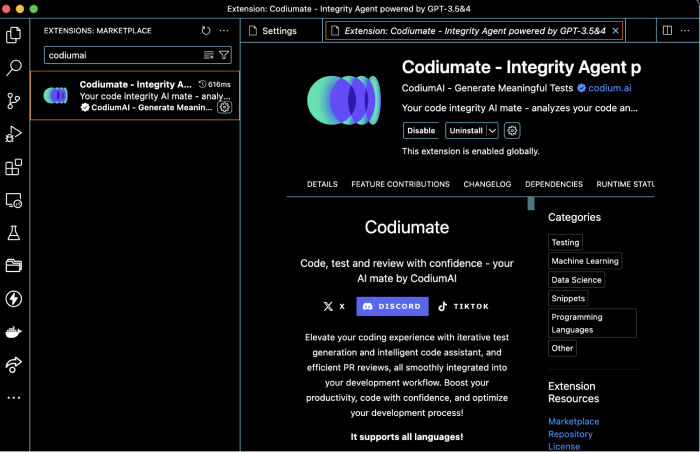
Setting Up Our Laravel Project
With the Qodo (formerly Codium) VSCode Extension successfully installed and configured, it’s time to set up the Laravel project we’ll use in this article. Let’s get started with these simple steps:
- Clone the Task API project from GitHub by running the following command in your terminal:
“`
git clone https://github.com/davydocsurg/laravel-tests-with-codiumai
“` - Once the cloning process is complete, open the project in Visual Studio Code (VSCode).
- Now, install the project’s dependencies by running the following command in the terminal:
“`
composer install
“`
With these steps completed, our Laravel project is all set up and ready for development with Qodo (formerly Codium) IDE Extension.
Using Qodo (formerly Codium) IDE Extension for Testing Laravel Projects
Now that our Laravel project is set up, let’s leverage the power of Qodo (formerly Codium) to streamline our testing process. In this section, we’ll walk through the process of generating unit and feature tests for our Task API project. Follow these steps:
- Start by creating a MySQL database of your choice. This database will serve as the foundation for storing your application’s data.
- With your project open in VSCode, navigate to the `.env` file and update the designated keys with your database credentials. This step ensures seamless interaction between your Laravel application and the MySQL database. Here’s the snippet you need to modify:
“`text
DB_DATABASE=YOUR_DATABASEDB_USERNAME=YOUR_DATABASE_USERNAME
DB_PASSWORD=YOUR_DATABASE_PASSWORD
“` - Execute the following commands in the terminal to migrate the database schema to your MySQL database:
“`
php artisan migrate
“`
This process ensures that your database structure aligns precisely with your Laravel project’s specifications, laying the groundwork for effective testing.
Generating Tests for Our TaskController Methods
Let’s streamline the process of generating tests for our `TaskController` methods. Follow these straightforward steps:
- Start by running the following command in your terminal to generate a `TaskTest.php` file:
“`bash
php artisan make:test TaskTest
“`
This command will create the test file in the `tests/Feature` directory. - Open your `TaskController.php` file. You’ll find it in the `app/Http/Controllers` directory. You should see something similar to the following image above each of the `TaskController` methods:
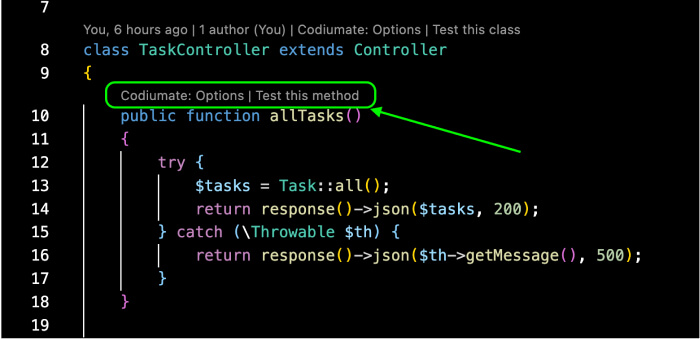
- Click on `Test this method` to trigger the test generation or on the `Qodo Gen (formerly Codiumate): Options` above the `allTasks()` method, then select the `/test Generate tests for your code` prompt.
After generating tests, Qodo (formerly Codium) will create a file and open it next to the `TaskController.php` file. Under the `Test Suite` tab, you should see three sections: `Improve tests quality and style`, `Behaviors coverage`, and `Tests` sections:
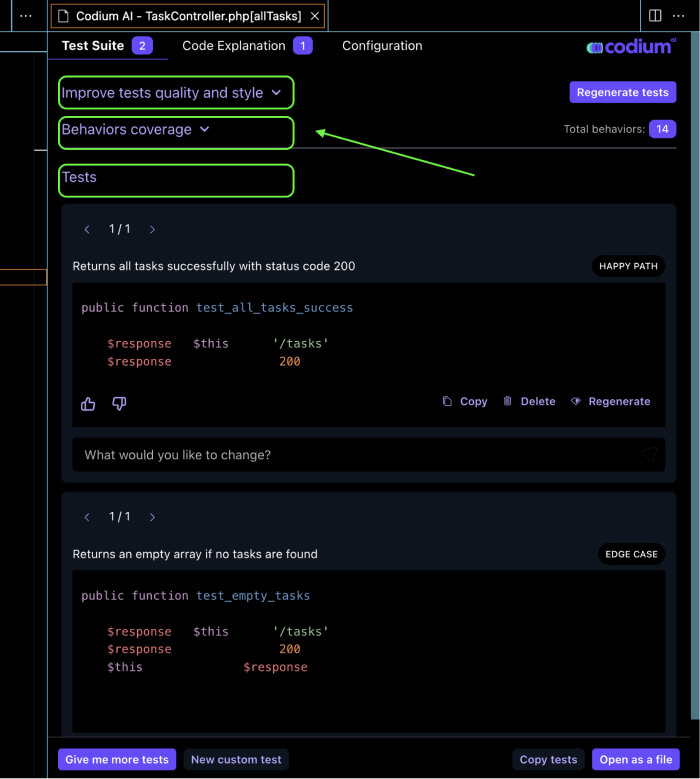
Improve Tests Quality and Style
The `Improve tests quality and style` section provides you with the opportunity to refine the quality and the style of the generated tests to ensure they align with your project’s standards. You can provide Qodo (formerly Codium) with an example test you want it to emulate, guiding the generation process toward producing tests that best suit your requirements.
Behaviors Coverage
The Behaviors coverage section contains various test behaviors generated by Qodo (formerly Codium) for the allTasks() method. Here, you’ll find sub-behaviors such as `Happy Path`, `Edge Cases`, `Other`, and an option to `Add Behavior`. Each sub-behavior represents a distinct testing scenario aimed at achieving comprehensive coverage of the `allTasks()` method.
The behaviors coverage section contains various test behaviors generated by Qodo (formerly Codium) for all the `TaskController` methods: `allTasks()`, `createTask()`, `updateTask()`, and `deleteTask()`. Here, you’ll find sub-behaviors such as Happy Path, Edge Cases, Other, and an option to Add Behavior. Each sub-behavior represents a distinct testing scenario aimed at achieving comprehensive coverage of the corresponding methods.
- Happy path: This sub-behavior covers the typical, expected execution flow for each of the `TaskController` methods, ensuring its functionality under normal circumstances. Examples could include tests ensuring successful retrieval, creation, update, and deletion of tasks with appropriate status codes and response data.
- Edge cases: These sub-behaviors explore potential edge cases or exceptional scenarios that each of our `TaskController` methods may encounter, verifying its behavior in less common situations. For example, scenarios like handling empty responses, error messages for exceptions, and validation of input parameters.
- Other: This sub-behavior might include tests for edge cases not covered in the previous categories, such as handling non-existent tasks, successful updates and deletions, or validation of request parameters.
- Add behavior: You have the flexibility to define and add custom behaviors that you want Qodo (formerly Codium) to generate tests for, tailoring the testing process to your specific project requirements.
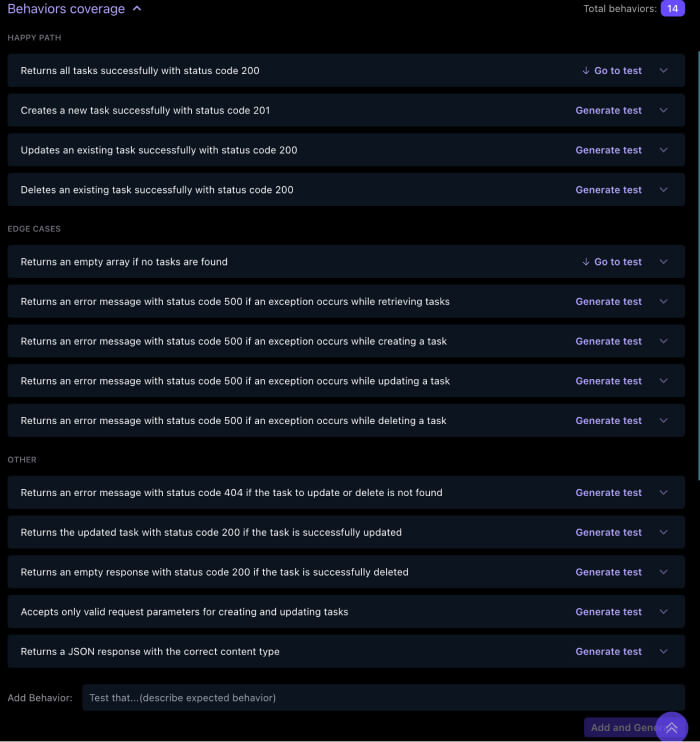
By leveraging the flexibility of Qodo (formerly Codium) IDE Extension, you can customize and expand upon these generated tests to ensure comprehensive test coverage tailored to your Laravel project’s specific needs.
Tests
In the Tests section, you’ll discover the generated test cases corresponding to each sub-behavior. Qodo (formerly Codium) automatically generates the initial test for each sub-behavior, providing you with a starting point for testing the functionality of your `TaskController` methods.
Additionally, Qodo (formerly Codium) allows you to customize and refine individual tests according to your project’s requirements. Within each test block, you can modify the test parameters by entering your desired changes in the provided text field:
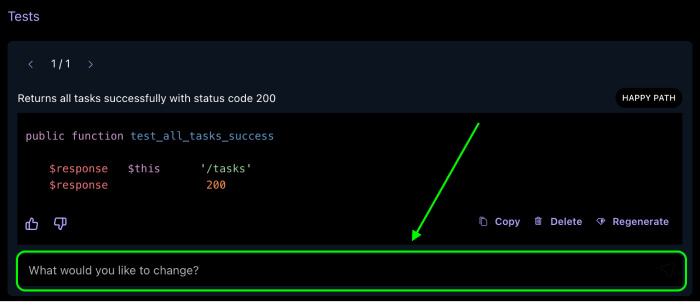
For example, Laravel’s API routes are prefixed with `/api`. So, it’s obvious that the above test will fail. You can tell Qodo (formerly Codium) to prefix `/tasks` with `/api` by entering this in the text box – “prefix `/tasks` with `/api`” and pressing enter. Qodo (formerly Codium) will update the above test and provide you with something similar to the one below:
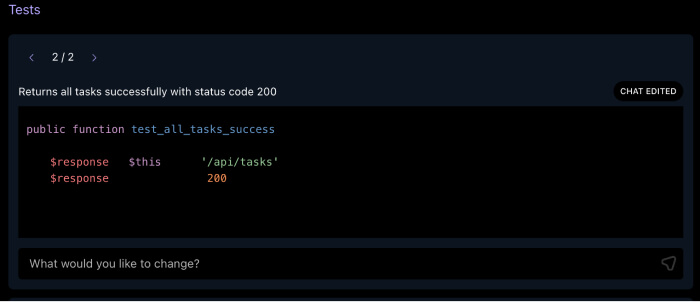
You can see that the endpoint has been modified, and every other test you generate will automatically follow the new instructions. We can proceed to run our tests now.
Running the Tests
With our tests generated and ready, it’s crucial to validate their accuracy by running them.
- Navigate to your `TaskTest.php` file located in the `tests/Feature` directory of your Laravel project. Paste the generated tests into this file, ensuring they are correctly integrated:
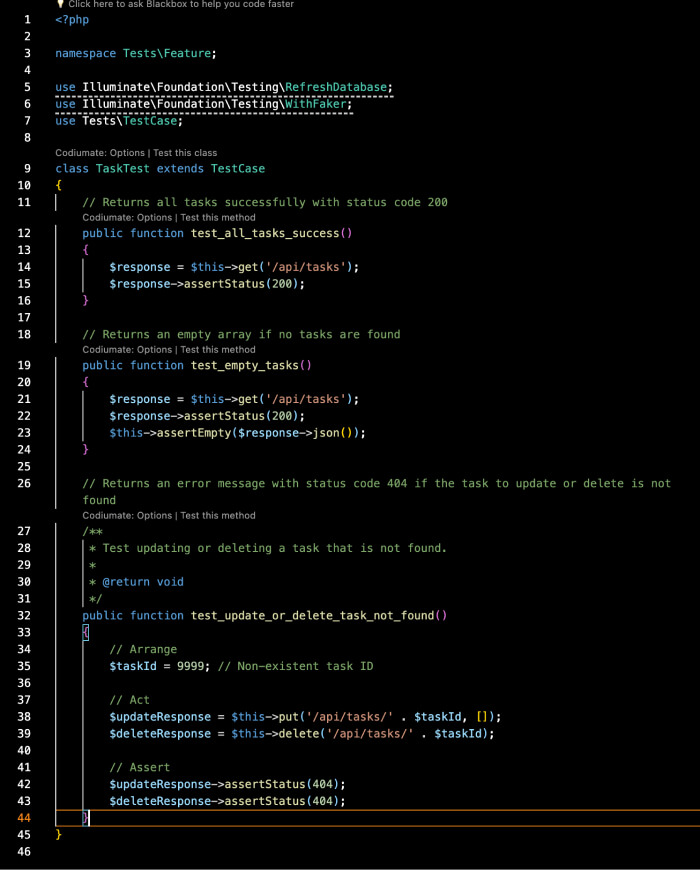
- In your terminal, execute the following commands to run the test suites:
“`bash
php artisan test
“`
This command will execute the tests and verify their functionality against your Laravel application. - After running the tests, carefully review the output displayed in your terminal. If all tests pass successfully, you should see a confirmation message indicating that the tests were executed without errors. Here’s an example of what the successful test output might resemble:

Congratulations! Your tests have been executed successfully, ensuring the reliability and functionality of your Laravel application. If any tests fail, review the error messages provided to diagnose and address any issues encountered during testing.
Best Practices for Testing Laravel Projects with Qodo (formerly Codium)
In this section, we’ll explore some best practices for effectively testing Laravel projects using Qodo (formerly Codium) IDE Extension. By following these guidelines, you can ensure comprehensive test coverage and streamline your testing process.
Writing Effective Test Cases:
- Prioritize test coverage: Identify critical functionalities and edge cases in your Laravel application and ensure they are thoroughly tested.
- Keep tests atomic: Write tests that focus on testing a single unit of functionality to maintain clarity and facilitate debugging.
- Use descriptive test names: Clearly describe the purpose and expected behavior of each test case to improve readability and understanding.
- Leverage data providers: Utilize data providers to test multiple input variations and scenarios efficiently, reducing duplication of test code.
Leveraging Advanced Features of Qodo (formerly Codium) for Efficient Testing:
- Customize test generation: Tailor test generation by providing specific examples and refining generated tests to match your project’s requirements.
- Utilize sub-behaviors: Break down tests into smaller, more manageable steps using sub-behaviors to focus on specific aspects of functionality.
- Employ TestGPT for mocking: Leverage TestGPT to generate mock objects and data for external services, isolating tests and ensuring they run smoothly without dependencies on real-world connections.
Integrating Qodo (formerly Codium) into CI/CD Pipelines:
- Automate testing process: Integrate qodo(formerly Codium)-generated tests into your Continuous Integration/Continuous Deployment (CI/CD) pipelines to automate the testing process.
- Run tests in pre-production environments: Execute tests in pre-production environments to identify and address issues early in the development cycle, ensuring a smoother deployment process.
- Monitor test coverage: Regularly monitor test coverage metrics to track the effectiveness of your testing efforts and identify areas for improvement.
By adhering to these best practices and leveraging the advanced features of Qodo (formerly Codium) IDE Extension, you can enhance the reliability, efficiency, and maintainability of your Laravel projects’ testing process.
Conclusion
Testing plays a crucial role in ensuring the reliability and stability of applications built on the Laravel framework. Laravel unit tests, in particular, are essential for verifying the functionality of individual components within the Laravel framework. By adopting effective testing practices, developers can mitigate risks, identify bugs early in the development cycle, and maintain the overall quality of their Laravel applications.
Leveraging Qodo (formerly Codium) IDE Extension for testing Laravel projects offers several benefits:
- Accelerated test generation: Qodo (formerly Codium) automates the generation of unit, integration, and feature tests, saving developers time and effort.
- Improved test coverage: By leveraging AI capabilities, Qodo (formerly Codium) ensures comprehensive test coverage, enhancing the reliability and stability of Laravel applications.
- Enhanced code quality: Qodo (formerly Codium) generates tests that adhere to Laravel best practices, promoting cleaner, more maintainable code.
Looking ahead, there are exciting prospects and enhancements for Qodo (formerly Codium) in testing Laravel projects. As the AI model evolves and new features are introduced, developers can expect even greater efficiency and accuracy in test generation, further enhancing the testing process for Laravel projects.
In conclusion, I encourage developers to embrace Qodo (formerly Codium) for testing their projects. By integrating Qodo (formerly Codium) into their testing workflow, developers can ensure the quality and reliability of their applications, ultimately delivering better experiences to their users.

